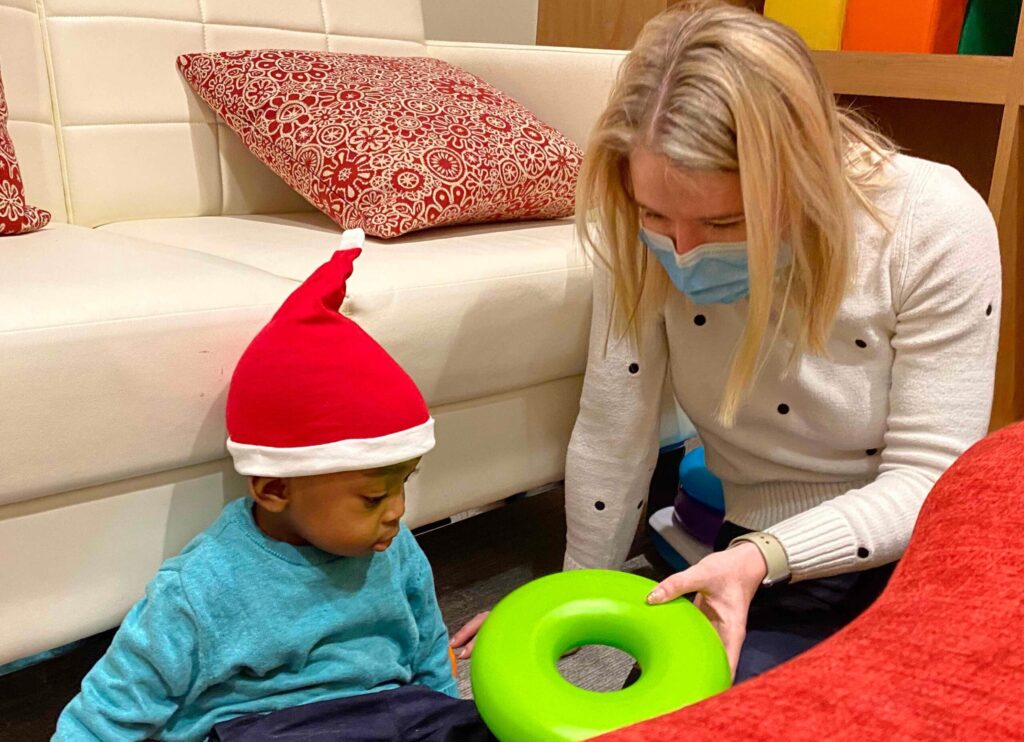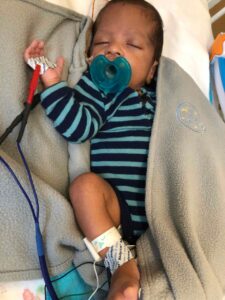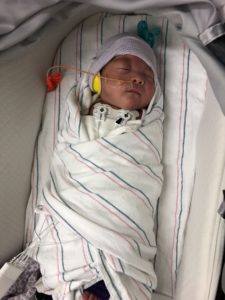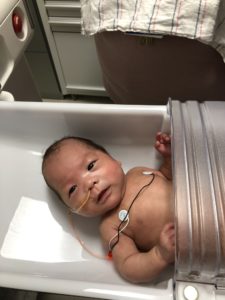Breast milk is important in the NICU because it protects preterm babies from infections and intestinal complications. One challenge is making sure that preterm babies who are fed breast milk get the right amount of nutrition for healthy growth. Our past research shows that the levels of nutrients in breast milk — like protein and fat – differ from one mom to another. Also, each mom’s breast milk changes from day to day. Currently, the nutrients in breast milk are not measured before fortifying it. This means that even when breast milk is fortified, some babies may receive fewer nutrients than they need to grow.
The Nourish Study compares two different ways to fortify breast milk. Our study team measures babies in several ways to compare how these different ways to fortify milk affect their growth and brain development.
We use a device called a Human Milk Analyzer to measure the exact nutrients in mom’s pumped breast milk or in donor milk. We designed the study to see if adding nutrients based on what is actually in mom’s breast milk or donor milk each day provides better nutrition for preterm babies. This process is called individualized fortification.
All babies in the Nourish Study receive human milk – either mom’s pumped breast milk, donor milk, or both. Mom’s milk is used first, and donor milk is added only if there is not enough mom’s milk. All milk is fortified based on the NICU standard of care.
Each weekday, we take about 1 teaspoon of breast milk. We analyze some of the milk to find out how much protein, fat, and energy is in it, and freeze the rest of it for future research.
Babies in the study are randomly assigned, like flipping a coin, into one of two diet groups: the standard group, or the individualized fortification group. Only the research assistants preparing the milk know which group each baby is in. The other researchers and the clinical team do not know.
For babies in the standard group, milk is fortified just like for babies in the NICU who are not in the study. For babies in the individualized group, we may add extra liquid protein and/or fat to the milk, depending on the results of the milk analysis. After the milk is fortified, it is given to the baby’s nurse to feed the baby.
The Nourish Study prepares the baby’s milk until he/she reaches 36 weeks post-menstrual age – about one month before your due date for the pregnancy. After this point, the baby will be fed according to clinical routine every day until he/she goes home.
Our study carefully tracks each baby to see if the type of fortification makes a difference. We measure the baby’s weight, length, and head circumference regularly. We also measure the baby’s body composition (fat and lean mass) with a PEA POD scale and with a bioelectrical impedance device (BIS). To measure brain growth and development, we perform a brain MRI scan on the baby before he/she goes home from the NICU. A NICU nurse or doctor stays with the baby during the entire scan.
What is the PEA POD and how does it work?
The PEA POD is like a small isolette with warm air swishing around inside it. Baby is monitored by a nurse the entire time, which takes less than 5 minutes. We only measure baby with the PEA POD when he/she is stable and can breathe on room air.
What is the BIS and how does it work?
The BIS is a small device that has electrodes placed on baby’s hand and foot. These electrodes are similar to the ones already used on baby’s chest. They run a weak, painless current through baby’s body. This takes less than 5 minutes and takes place in baby’s room.
It is a big milestone when baby is ready to be discharged from the NICU. To figure out which type of fortification is best, we also need to track baby’s growth and development after he/she leaves the NICU. We are asking parents to allow us to stay in touch after the baby completes the study diet and goes home, so that we can check on how the baby and family are doing. We have questionnaires to fill out at 4 months and 12 months corrected age (time from baby’s original due date) that can be done online. We are also asking to evaluate babies at 2 years corrected age, during a visit to the Center for Child Development as part of our NICU Follow-up Program. The assessments include weighing, measuring, and completing three tests with a child psychologist. We work to coordinate this visit with regular clinic visits for baby.





